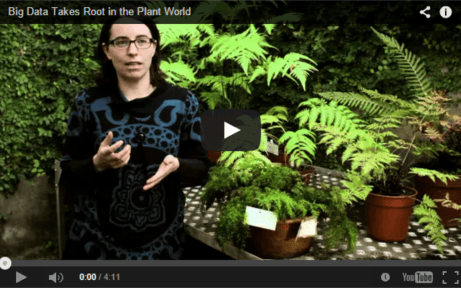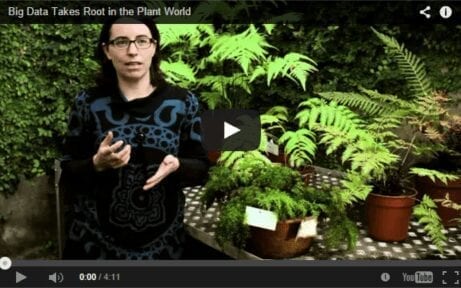
Botanists at Trinity College Dublin have launched a database with information that documents significant ‘life events’ for nearly 600 plant species across the globe. They clubbed together with like-minded individuals working across five different continents to compile the huge database of plant life histories, for which data have been gathered over a near 50-year span.
At a time in which climate change and increasing human populations are rapidly re-shaping plant distributions, the researchers hope their COMPADRE Plant Matrix database will foster collaborations between scientists and allow them to better answer questions such as how we can conserve the species that are critical for ecosystem services, and which may provide food for billions.
The botanists have just published an article in the prestigious international, peer-reviewed publication Journal of Ecology that describes the database. By making the precious data it contains free to download, they hope to inspire and accelerate important global research on plant biology.
“We hope that other scientists will use these data to answer questions such as why, unlike humans, some plants don’t deteriorate as they age, why some environments are better for agriculture than others, and how fast plant populations will move in response to climate change,” said Professor of Zoology in Trinity’s School of Natural Sciences, Yvonne Buckley.
She added: “Making the database freely available is our 21st Century revamp of the similarly inspired investments in living plant collections that were made to botanic gardens through the centuries; these were also set up to bring economic, medicinal and agricultural advantages of plants to people all over the world. Our database is moving this gift into the digital age of ‘Big Data’.”
We are used to shops, websites and companies keeping track of our purchases, what we eat, who we date, and even when and how we exercise. Keeping track of the most intimate details of life, death and reproduction should not be unique to human populations, though.
We rely on plants for some of our most basic needs like food, shelter and clothing. It is therefore vital that we know the ‘hows’, ‘whys’ and ‘wherefores’ governing the success of a diverse range of plant species so that we can protect them and put them to use for the good of the world.
The Latest on: Plant Research
[google_news title=”” keyword=”Plant Research” num_posts=”10″ blurb_length=”0″ show_thumb=”left”]
via Google News
The Latest on: Plant Research
- University of Texas Reaches Sustainability Goal of Serving 50% Plant-Based Meals on Campuson May 8, 2024 at 6:44 pm
University of Texas has achieved a significant milestone by fulfilling the Forward Food pledge in collaboration with the Humane Society.
- Environmental Changes Are Fueling Human, Animal and Plant Diseases, Study Findson May 8, 2024 at 8:31 am
Biodiversity loss, global warming, pollution and the spread of invasive species are making infectious diseases more dangerous to organisms around the world.
- Why is breaking down plant material for biofuels so slow?on May 8, 2024 at 7:13 am
Tracking individual enzymes during the breakdown of cellulose for biofuel production has revealed how several roadblocks slow this process when using plant material that might otherwise go to waste.
- UK university builds new lab to help develop climate-resilient plantson May 7, 2024 at 4:01 pm
UK university builds new lab to help develop climate-resilient plants - The £3 million facility at the University of Essex has an indoor field that replicates real environments anywhere on the globe.
- Plant Researchers and Molecular Biologist Elected to National Academy of Scienceson May 7, 2024 at 10:34 am
Three professors from the University of California, Davis, have been elected as members of the National Academy of Sciences. They are among 120 new members and 24 international members announced by ...
- International Plant Health Day: Understanding in the laboratory what happens in the fieldon May 7, 2024 at 7:44 am
May 12 is International Plant Health Day: Freiburg biologists Jürgen Kleine-Vehn, Thomas Ott and Aida Maric on the relevance of research into plant growth, nutrient uptake and resilience.
- Plant Growth Regulators Market to Reach $5.41 Billion by 2031 - Exclusive Report by Meticulous Research®on May 7, 2024 at 7:30 am
According to a new market research report titled, 'Plant Growth Regulators Market by Type (Cytokinins, Auxins, Gibberellins, Ethylene, Abscisic Acid), Formulation (Wettable Powders, Solutions), ...
- Research team develops fast-track process for genetic improvement of plant traitson May 6, 2024 at 12:10 pm
Researchers interested in improving a given trait in plants can now identify the genes that regulate the trait's expression without doing any experiments.
- Plants can communicate and respond to touch. Does that mean they're intelligent?on May 6, 2024 at 11:57 am
Climate journalist Zoë Schlanger says research suggests that plants are indeed "intelligent" in complex ways that challenge our understanding of agency and consciousness. Her book is The Light Eaters.
- Plant-based diet may aid prostate cancer outcomeson May 6, 2024 at 4:10 am
Consuming a primarily plant-based diet may be associated with better cancer-specific health outcomes among men with prostate cancer, according to a study published online May 1 in JAMA Network Open.
via Bing News











